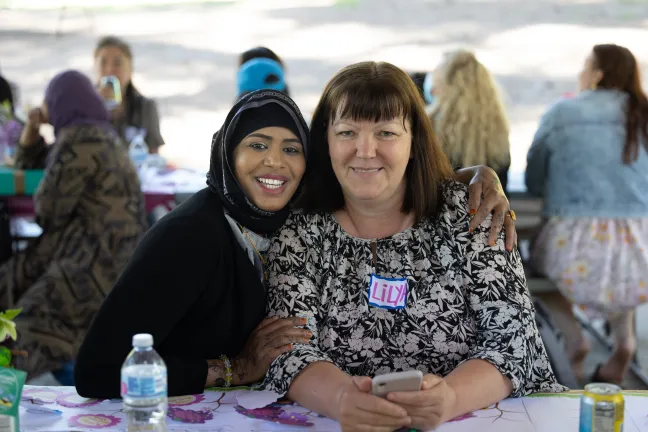This is part two of a three-part series on the evolution of Multnomah County’s COVID-19 response team. Part one can be read here.
‘The end of the line’: Connecting community to urgent wraparound services that offered stability, relief
It became clear that those calling the COVID-19 Call Center or being contacted by Communicable Disease (CD) case investigators needed more than just public health guidance and access to testing. People who were sick or exposed and had been asked to stay home needed help paying bills, buying groceries, and avoiding eviction. The unprecedented scale of need throughout the pandemic required leveraging new and existing partnerships to meet these needs.
Initially, the CD case investigation team was conducting investigation while also connecting community members with partner organizations for wraparound services. The Call Center stepped into this role in January 2021. The Call Center would pick up the call after CD finished their work, talk with people about their household’s needs, and place referrals to our partner organizations. Over the next 2 1/2 years, the Call Center would help approximately 9,000 families access wraparound services.
Julie Hackett, the Call Center supervisor, explained that case investigators would do the initial interview: “Do you need help staying home? Do you need help with groceries and bills? And if they said yes, then they would transfer the call to our team.”
The Call Center would often place an initial urgent grocery order, then refer clients to the community-based organizations (CBOs) who could help pay bills, deliver personal protective equipment and provide navigation of health services.
The County looked to the CBOs it had partnered with — some for decades — to bolster their capacity for meeting the needs of the communities they served. In mid-2020, the County began using federal COVID-19 recovery dollars to fund 40 community health workers across 28 of these partner organizations who could provide on-the-ground connection and resources to people in need.
Chi Bui, a community health worker partnerships specialist, explained how the Call Center could refer individuals to a CBO for rental assistance or help someone navigate vaccination events or find a test, but that support only captured a small portion of a community member’s full needs when they had COVID-19. CHWs could provide one-on-one support to community members.
“There were a lot of barriers created by the pandemic, and community health workers helped the community navigate those pieces such as signing up for unemployment or finding a doctor,” said Bui.
“The success lies with the community health workers at the community-based organizations,” said Pei-ru Wang, the community partnerships and capacity building manager. “It’s the community health workers who are doing the hard work. They are the true heroes.”
In August 2020, the COVID-19 response team grew to include Bienestar de la Familia, a program within the County’s Department of Human Services Youth and Family Services Division. For the past 25 years, Bienestar has provided resources to the Latinx and Somali communities in the Cully neighborhood of Northeast Portland. Bienestar’s COVID-19 wraparound program was focused on providing assistance with food, utility bills or housing costs.
Once Bienestar’s COVID-19 wraparound program launched, the Call Center could refer callers to a CBO and that CBO could either pay directly for bills, or refer to Bienestar to pay the larger bills/needs. Community members might also have been referred directly to Bienestar from a CBO or be referred to a CBO from Bienestar.
Bienestar’s mission during the pandemic was to provide direct assistance. When their wraparound project started, there were just four people responding to referrals from the Call Center and the CBOs. As the needs of the community grew, more staff were hired to expand the program. At the highest point, there were 25 case managers involved in the wraparound effort. Bienestar created an internal triage team from the ground up to help eligible clients pay for groceries, utilities, rent or mortgage payments, depending on the client’s needs.
Xochitl Alvarez, the Bienestar wraparound program supervisor, recalled that when the program started in August 2020, she and her small team of three did not know what they were getting into.
“There was nothing before it, and so we just developed as we went along,” said Alvarez. “From there, we built out the program to have team members who could help make food deliveries and pay utilities and rent.”
Once the program launched, the referrals kept coming and coming. Juan Leon, the other Bienestar wraparound program supervisor, explained that when COVID-19 cases surged, so would the need for services.
“On average, Bienestar received 300 to 400 referrals a month,” said Leon. “During our biggest surge in January 2022, we received 1,500 referrals — around 300 referrals per week.”
“By the time we talked to people at the Call Center, they were already in crisis. By the time Bienestar was providing services, they were dealing with very urgent needs. Bienestar was the end of the line,” said Hackett. “People called us and already had the power shut off, an eviction notice, an angry landlord, or a roommate who threatened to kick them out because they didn’t want to live with somebody who had COVID-19.”
While the work was at times extremely demanding and emotionally taxing, Bienestar’s team never failed to rise to the occasion. The team, made up of people of color, spoke a combination of Spanish, Farsi and Somali, which allowed case managers to serve their own communities.
“We were given this opportunity to work and give back. That’s why it always felt like there was so much positive energy because we saw ourselves in the community that we were helping,” said Alvarez.
Combining the services provided by the CD team, the Call Center, Bienestar, the County’s Integrated Clinical Service Division, and CBO partners, the wraparound program served more than 13,000 households.



